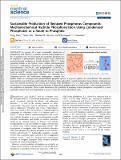Sustainable Production of Reduced Phosphorus Compounds: Mechanochemical Hydride Phosphorylation Using Condensed Phosphates as a Route to Phosphite
Author(s)
Zhai, Feng; Xin, Tiansi; Geeson, Michael B; Cummins, Christopher C
DownloadPublished version (2.117Mb)
Publisher with Creative Commons License
Publisher with Creative Commons License
Creative Commons Attribution
Terms of use
Metadata
Show full item recordAbstract
In pursuit of a more sustainable production of phosphorous acid (H3PO3), a versatile chemical with phosphorus in the +3 oxidation state, we herein report that condensed phosphates can be employed to phosphorylate hydride reagents under solvent-free mechanochemical conditions to furnish phosphite (HPO3 2-). Using potassium hydride as the hydride source, sodium trimetaphosphate (Na3P3O9), triphosphate (Na5P3O10), pyrophosphate (Na4P2O7), fluorophosphate (Na2PO3F), and polyphosphate ("(NaPO3) n ") engendered phosphite in optimized yields of 44, 58, 44, 84, and 55% based on total P content, respectively. Formation of overreduced products including hypophosphite (H2PO2 -) was identified as a competing process, and mechanistic investigations revealed that hydride attack on in-situ-generated phosphorylated phosphite species is a potent pathway for overreduction. The phosphite generated from our method was easily isolated in the form of barium phosphite, a useful intermediate for production of phosphorous acid. This method circumvents the need to pass through white phosphorus (P4) as a high-energy intermediate and mitigates involvement of environmentally hazardous chemicals. A bioproduced polyphosphate was found to be a viable starting material for the production of phosphite. These results demonstrate the possibility of accessing reduced phosphorus compounds in a more sustainable manner and, more importantly, a means to close the modern phosphorus cycle.
Date issued
2022Department
Massachusetts Institute of Technology. Department of ChemistryJournal
ACS Central Science
Publisher
American Chemical Society (ACS)
Citation
Zhai, Feng, Xin, Tiansi, Geeson, Michael B and Cummins, Christopher C. 2022. "Sustainable Production of Reduced Phosphorus Compounds: Mechanochemical Hydride Phosphorylation Using Condensed Phosphates as a Route to Phosphite." ACS Central Science, 8 (3).
Version: Final published version